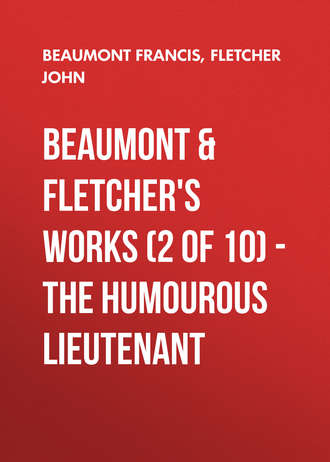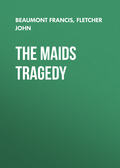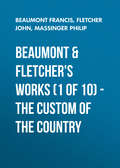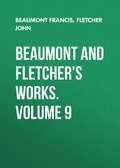
Beaumont Francis
Beaumont & Fletchers Works (2 of 10) – the Humourous Lieutenant
Persons Represented in the Play
King Antigonus, an old Man with young desires.
Demetrius, Son to Antigonus, in love with Celia.
Seleucus, Lysimachus, Ptolomie, Three Kings equal sharers with
Antigonus of what Alexander had, with united powers opposing
Antigonus.
Leontius, a brave old merry Souldier, assistant to Demetrius.
Timon, Charinthus, Menippus, Servants to Antigonus, and his vices.
The Humourous Lieutenant.
Gentlemen, Friends and followers of Demetrius.
_3 Embassadors, from the three Kings.
Gentlemen-Ushers._
Grooms.
Citizens.
Physicians.
Herald.
Magician.
Souldiers.
Host.
WOMEN.
Celia alias E[n]anthe, Daughter to Seleucus, Mistris to Demetrius.
Leucippe, a Bawd, Agent for the King's lust.
Ladies.
Citizens Wives.
Governesse to Celia.
A Country-Woman.
Phoebe, her Daughter.
2 Servants of the game.
The Scene Greece.
The principal Actors were,
Henry Condel. John Lowin. Richard Sharpe. Robert Benfeild. Joseph Taylor. William Eglestone. John Underwood. Thomas Polard.
ACTUS PRIMUS. SCENA PRIMA
Enter 2 Ushers, and Grooms with perfumes.
1 Usher. Round, round, perfume it round, quick, look ye Diligently the state be right, are these the richest Cushions? Fie, fie, who waits i'th' wardrobe?
2 Ush. But pray tell me, do you think for certain These Embassadours shall have this morning audience?
1 Ush. They shall have it: Lord that you live at Court And understand not! I tell you they must have it.
2 Ush. Upon what necessity?
1 Ush. Still you are out of the trick of Court, sell your place,
Enter Ladies and Gentlemen.
And sow your grounds, you are not for this tillage.
Madams, the best way is the upper lodgings,
There you may see at ease.
Ladies. We thank you, Sir. [Ex. Ladies, Gent.
1 Ush. Would you have all these slighted? who should report then,
The Embassadors were handsome men? his beard
A neat one? the fire of his eyes quicker than lightning,
And when it breaks, as blasting? his legs, though little ones,
Yet movers of a mass of understanding?
Who shall commend their Cloaths? who shall take notice
Of the most wise behaviour of their Feathers?
Ye live a raw man here.
2 Ush. I think I do so.
Enter 2 citizens, and Wives.
1 Ush. Why, whither would ye all press?
1 Cit. Good Master Usher.
2 Cit. My wife, and some few of my honest neighbours, here.
1 Ush. Prethee begone thou and thy honest Neighbours, Thou lookst like an Ass, why, whither would you fish face?
2 Cit. If I might have
But the honour to see you at my poor house, Sir,
A Capon bridled and sadled, I'le assure your worship,
A shoulder of Mutton and a pottle of Wine, Sir,
I know your Brother, he was like ye,
And shot the best at Buts—
1 Ush. A – upon thee.
2 Cit. Some Musick I'le assure you too, My toy, Sir, can play o'th' Virginals.
1 Ush. Prethee good toy,
Take away thy shoulder of Mutton, it is flie-blown,
And shoulder take thy flap along, here's no place for ye;
Nay then you had best be knock'd. [Ex. Cit.
Enter Celia.
Cel. I wou'd fain see him,
The glory of this place makes me remember,
But dye those thoughts, dye all but my desires,
Even those to death are sick too; he's not here,
Nor how my eyes may guide me—
1 Ush. What's your business? Who keeps the outward door there? here's fine shuffling, You wastcoateer you must go back.
Cel. There is not,
There cannot be, six days and never see me?
There must not be desire; Sir, do you think
That if you had a Mistris—
1 Ush. Death, she is mad.
Cel. And were yourself an honest man? it cannot—
1 Ush. What a Devil hast thou to do with me or my honesty? Will you be jogging, good nimble tongue, My fellow door-keeper.
2 Ush. Prethee let her alone,
1 Ush. The King is coming, And shall we have an agent from the Suburbs Come to crave audience too?
Cel. Before I thought ye
To have a little breeding, some tang of Gentry;
But now I take ye plainly,
Without the help of any perspective,
For that ye cannot alter.
1 Ush. What's that?
Cel. An Ass, Sir, you bray as like one,
And by my troth, me thinks as ye stand now,
Considering who to kick next, you appear to me
Just with that kind of gravity, and wisdom;
Your place may bear the name of Gentleman,
But if ever any of that butter stick to your bread—
2 Ush. You must be modester.
Cel. Let him use me nobler,
And wear good Cloaths to do good Offices;
They hang upon a fellow of his vertue,
As though they hung on Gibbets.
2 Ush. A perillous wench.
1 Ush. Thrust her into a corner, I'le no more on her.
2 Ush. You have enough, go pretty Maid, stand close, And use that little tongue, with a little more temper.
Cel. I thank ye, Sir.
2 Ush. When the show's past,
I'le have ye into the Cellar, there we'll dine.
A very pretty wench, a witty Rogue,
And there we'll be as merry; can ye be merry?
Cel. O very merry.
2 Ush. Only our selves; this churlish fellow shall not know.
Cel. By no means.
2 Ush. And can you love a little?
Cel. Love exceedingly: I have cause to love you, dear Sir.
2 Ush. Then I'le carry ye,
And shew you all the pictures, and the hangings,
The Lodgings, Gardens, and the walks: and then, sweet,
You shall tell me where you lye.
Cel. Yes marry will I.
2 Ush. And't shall go hard but I'le send ye a Venison Pasty, And bring a bottle of wine along.
1 Ush. Make room there,
2 Ush. Room there afore; stand close, the train is coming.
Enter King Antigonus, Timon, Charinthus, Menippus.
Cel. Have I yet left a beauty to catch fools? Yet, yet, I see him not. O what a misery Is love, expected long, deluded longer!
Ant. Conduct in the Embassadors.
1 Ush. Make room there.
Ant. They shall not wait long answer— [Flourish.
Cle. Yet he comes not.
Enter 3 Embassadors.
Why are eyes set on these, and multitudes
Follow to make these wonders? O good gods!
What would these look like if my love were here?
But I am fond, forgetful.
Ant. Now your grievance, Speak short, and have as short dispatch.
1 Emb. Then thus, Sir:
In all our Royal Masters names, We tell you,
Ye have done injustice, broke the bonds of concord,
And from their equal shares, from Alexander
Parted, and so possess'd, not like a Brother,
But as an open Enemy, Ye have hedged in
Whole Provinces, man'd and maintain'd these injuries;
And daily with your sword (though they still honour ye)
Make bloudy inroads, take Towns, and ruin Castles,
And still their sufFerance feels the weight.
2 Em. Think of that love, great Sir, that honor'd friendship
Your self held with our Masters, think of that strength
When you were all one body, all one mind;
When all your swords struck one way, when your angers,
Like so many brother Billows rose together,
And curling up your foaming Crests, defied
Even mighty Kings, and in their falls entomb'd 'em;
O think of these; and you that have been Conquerours,
That ever led your Fortunes open ey'd,
Chain'd fast by confidence; you that fame courted,
Now ye want Enemies and men to match ye,
Let not your own Swords seek your ends to shame ye.
Enter Demetrius with a Javelin, and Gentlemen.
3 Em. Choose which you will, or Peace or War, We come prepar'd for either.
1 Ush. Room for the Prince there.
Cel. Was it the Prince they said? how my heart trembled!
'Tis he indeed; what a sweet noble fierceness
Dwells in his eyes! young Meleager like,
When he return'd from slaughter of the Boar,
Crown'd with the loves and honours of the people,
With all the gallant youth of Greece, he looks now,
Who could deny him love?
Dem. Hail Royal Father.
Ant. Ye are welcome from your sport, Sir, do you see this Gent.
You that bring Thunders in your mouths, and Earthquakes
To shake and totter my designs? can you imagine
(You men of poor and common apprehensions)
While I admit this man, my Son, this nature
That in one look carries more fire, and fierceness,
Than all your Masters in their lives; dare I admit him,
Admit him thus, even to my side, my bosom,
When he is fit to rule, when all men cry him,
And all hopes hang about his head; thus place him,
His weapon hatched in bloud, all these attending
When he shall make their fortunes, all as sudden
In any expedition he shall point 'em,
As arrows from a Tartars bow, and speeding,
Dare I do this, and fear an enemy?
Fear your great Master? yours? or yours?
Dem. O Hercules!
Who saies you do, Sir? Is there any thing
In these mens faces, or their Masters actions,
Able to work such wonders?
Cel. Now he speaks: O I could dwell upon that tongue for ever.
Dem. You call 'em Kings, they never wore those Royalties,
Nor in the progress of their lives arriv'd yet
At any thought of King: Imperial dignities,
And powerful God-like actions, fit for Princes
They can no more put on, and make 'em sit right,
Than I can with this mortal hand hold Heaven:
Poor petty men, nor have I yet forgot
The chiefest honours time, and merit gave 'em:
Lisimachus your Master, at the best,
His highest, and his hopeful'st Dignities
Was but grand-master of the Elephants;
Seleuchus of the Treasure; and for Ptolomey,
A thing not thought on then, scarce heard of yet,
Some Master of Ammunition: and must these men—
Cel. What a brave confidence flows from his spirit! O sweet young man!
Dem. Must these, hold pace with us,
And on the same file hang their memories?
Must these examine what the wills of Kings are?
Prescribe to their designs, and chain their actions
To their restraints? be friends, and foes when they please?
Send out their Thunders, and their menaces,
As if the fate of mortal things were theirs?
Go home good men, and tell your Masters from us,
We do 'em too much honour to force from 'em
Their barren Countries, ruin their vast Cities,
And tell 'em out of love, we mean to leave 'em
(Since they will needs be Kings) no more to tread on,
Than they have able wits, and powers to manage,
And so we shall befriend 'em. Ha! what does she there?
Emb. This is your answer King?
Ant. 'Tis like to prove so.
Dem. Fie, sweet, what makes you here?
Cel. Pray ye do not chide me.
Dem. You do your self much wrong and me.
I feel my fault which only was committed
Through my dear love to you: I have not seen ye,
And how can I live then? I have not spoke to ye—
Dem. I know this week ye have not; I will redeem all. You are so tender now; think where you are, sweet.
Cel. What other light have I left?
Dem. Prethee Celia, Indeed I'le see you presently.
Cel. I have done, Sir: You will not miss?
Dem. By this, and this, I will not.
Cel. 'Tis in your will and I must be obedient.
Dem. No more of these assemblies.
Cel. I am commanded.
1 Ush. Room for the Lady there: Madam, my service—
1 Gent. My Coach an't please you Lady.
2 Ush. Room before there.
2 Gent. The honour, Madam, but to wait upon you— My servants and my state.
Cel. Lord, how they flock now!
Before I was afraid they would have beat me;
How these flies play i'th' Sun-shine! pray ye no services,
Or if ye needs must play the Hobby-horses,
Seek out some beauty that affects 'em: farewel,
Nay pray ye spare: Gentlemen I am old enough
To go alone at these years, without crutches. [Exit.
2 Ush. Well I could curse now: but that will not help me,
I made as sure account of this wench now, immediately,
Do but consider how the Devil has crost me,
Meat for my Master she cries, well—
3 Em. Once more, Sir, We ask your resolutions: Peace or War yet?
Dem. War, War, my noble Father.
1 Em. Thus I fling it: And fair ey'd peace, farewel.
Ant. You have your answer; Conduct out the Embassadours, and give 'em Convoyes.
Dem. Tell your high hearted Masters, they shall not seek us,
Nor cool i'th' field in expectation of us,
We'l ease your men those marches: In their strengths,
And full abilities of mind and courage,
We'l find 'em out, and at their best trim buckle with 'em.
3 Em. You will find so hot a Souldier's welcome, Sir, Your favour shall not freeze.
2 Em. A forward Gentleman, Pity the Wars should bruise such hopes—
Ant. Conduct em— [Ex. Em.
Now, for this preparation: where's Leontius?
Call him in presently: for I mean in person Gentlemen
My self, with my old fortune—
Dem. Royal Sir:
Thus low I beg this honour: fame already
Hath every where rais'd Trophies to your glory,
And conquest now grown old, and weak with following
The weary marches and the bloody shocks
You daily set her in: 'tis now scarce honour
For you that never knew to fight, but conquer,
To sparkle such poor people: the Royal Eagle
When she hath tri'd [h]er young ones 'gainst the Sun,
And found 'em right; next teacheth 'em to prey,
How to command on wing, and check below her
Even Birds of noble plume; I am your own, Sir,
You have found my spirit, try it now, and teach it
To stoop whole Kingdoms: leave a little for me:
Let not your glory be so greedy, Sir,
To eat up all my hopes; you gave me life,
If to that life you add not what's more lasting
A noble name, for man, you have made a shadow:
Bless me this day: bid me go on, and lead,
Bid me go on, no less fear'd, than Antigonus,
And to my maiden sword, tye fast your fortune:
I know 'twill fight it self then: dear Sir, honour me:
Never fair Virgin long'd so.
Ant. Rise, and command then,
And be as fortunate, as I expect ye:
I love that noble will; your young companions
Bred up and foster'd with ye, I hope Demetrius,
You will make souldiers too: they must not leave ye.
Enter Leontius.
2 Gent. Never till life leave us, Sir.
Ant. O Leontius, Here's work for you in hand.
Leon. I am ev'n right glad, Sir. For by my troth, I am now grown old with idleness; I hear we shall abroad, Sir.
Ant. Yes, and presently, But who think you commands now?
Leon. Who commands, Sir?
Methinks mine eye should guide me: can there be
(If you your self will spare him so much honour)
Any found out to lead before your Armies,
So full of faith, and fire, as brave Demetrius?
King Philips Son, at his years was an old Souldier,
'Tis time his Fortune be o' wing, high time, Sir,
So many idle hours, as here he loyters,
So many ever-living names he loses,
I hope 'tis he.
Ant. 'Tis he indeed, and nobly
He shall set forward: draw you all those Garrisons
Upon the frontiers as you pass: to those
Joyn these in pay at home, our ancient souldiers,
And as you go press all the Provinces.
Leo. We shall not [need];
Believe, this hopefull Gentleman
Can want no swords, nor honest hearts to follow him,
We shall be full, no fear Sir.
Ant. You Leontius,
Because you are an old and faithfull servant,
And know the wars, with all his vantages,
Be near to his instructions, lest his youth
Lose valours best companion, staid discretion,
Shew where to lead, to lodge, to charge with safetie;
In execution not to break, nor scatter,
But with a provident anger, follow nobly:
Not covetous of blood, and death, but honour,
Be ever near his watches; cheer his labours,
And where his hope stands fair, provoke his valour;
Love him, and think it no dishonour (my Demetrius)
To wear this Jewel near thee; he is a tri'd one,
And one that even in spight of time, that sunk him,
And frosted up his strength, will yet stand by thee,
And with the proudest of thine Enemies
Exchange for bloud, and bravely: take his Counsel.
Leo. Your grace hath made me young again, and wanton.
Ant. She must be known and suddenly: Do ye know her? [to Minippus.
Gent. Char. No, believe Sir.
Ant. Did you observe her, Timon?
Tim. I look'd on her, But what she is—
Ant. I must have that found. Come in and take your leave.
Tim. And some few Prayers along.
Dem. I know my duty, [Exit Ant. You shall be half my Father.
Leo. All your Servant: Come Gentlemen, you are resolv'd I am sure To see these wars.
1 Gent. We dare not leave his fortunes, Though most assur'd death hung round about us.
Leo. That bargain's yet to make;
Be not too hasty, when ye face the Enemie,
Nor too ambitious to get honour instantly,
But charge within your bounds, and keep close bodies,
And you shall see what sport we'l make these mad-caps;
You shall have game enough, I warrant ye,
Every mans Cock shall fight.
Dem. I must go see Sir:
Brave Sir, as soon as I have taken leave,
I'le meet you in the park;
Draw the men thither,
Wait you upon Leontius.
Gen. We'l attend Sir.
Leo. But I beseech your Grace, with speed; the sooner We are i'th' field.—
Dem. You could not please me better. [Exit.
Leo. You never saw the wars yet?
Gent. Not yet Colonel.
Leo. These foolish Mistresses do so hang about ye,
So whimper, and so hug, I know it Gentlemen,
And so intice ye, now ye are i'th' bud;
And that sweet tilting war, with eyes and kisses,
Th' alarms of soft vows, and sighs, and fiddle faddles,
Spoils all our trade: you must forget these knick knacks,
A woman at some time of year, I grant ye
She is necessarie; but make no business of her.
How now Lieutenant?
Enter Lieutenant.
Lieu. Oh Sir, as ill as ever; We shall have wars they say; they are mustring yonder: Would we were at it once: fie, how it plagues me.
Leo. Here's one has served now under Captain Cupid, And crackt a Pike in's youth: you see what's come on't.
Lieu. No, my disease will never prove so honourable.
Leo. Why sure, thou hast the best pox.
Lieu. If I have 'em, I am sure I got 'em in the best company; They are pox of thirty Coats.
Leo. Thou hast mewed 'em finely:
Here's a strange fellow now, and a brave fellow,
If we may say so of a pocky fellow,
(Which I believe we may) this poor Lieutenant;
Whether he have the scratches, or the scabs,
Or what a Devil it be, I'le say this for him,
There fights no braver souldier under Sun, Gentlemen;
Show him an Enemie, his pain's forgot straight;
And where other men by beds and bathes have ease,
And easie rules of Physick; set him in a danger,
A danger, that's a fearfull one indeed,
Ye rock him, and he will so play about ye,
Let it be ten to one he ne'er comes off again,
Ye have his heart: and then he works it bravely,
And throughly bravely: not a pang remembre'd:
I have seen him do such things, belief would shrink at.
Gent. 'Tis strange he should do all this, and diseas'd so.
Leo. I am sure 'tis true: Lieutenant, canst thou drink well?
Lieu. Would I were drunk, dog-drunk, I might not feel this backward?
Gent. I would take Physick.
Lieu. But I would know my disease first.
Leon. Why? it may be the Colique: canst thou blow
Lieu. There's never a bag-pipe in the Kingdom better.
Gent. Is't not a pleuresie?
Lieu. 'Tis any thing That has the Devil, and death in't: will ye march Gentlemen? The Prince has taken leave.
Leo. How know ye that?
Lieu. I saw him leave the Court, dispatch his followers,
And met him after in a by street: I think
He has some wench, or such a toy, to lick over
Before he go: would I had such another
To draw this foolish pain down.
Leo. Let's away Gentlemen, For sure the Prince will stay on us.
Gent. We'l attend Sir. [Exeunt.
SCENA II
Enter Demetrius, and Celia.
Cel. Must ye needs go?
Dem. Or stay with all dishonour.
Cel. Are there not men enough to fight?
Dem. Fie Celia. This ill becomes the noble love you bear me; Would you have your love a coward?
Cel. No; believe Sir, I would have him fight, but not so far off from me.
Dem. Wouldst have it thus? or thus?
Cel. If that be fighting—
Dem. Ye wanton fool: when I come home again I'le fight with thee, at thine own weapon Celia, And conquer thee too.
Cel. That you have done already, You need no other Arms to me, but these Sir; But will you fight your self Sir?
Dem. Thus deep in bloud wench, And through the thickest ranks of Pikes.
Cel. Spur bravely Your firie Courser, beat the troops before ye, And cramb the mouth of death with executions.
Dem. I would do more than these: But prethee tell me, Tell me my fair, where got'st thou this male Spirit? I wonder at thy mind.
Cel. Were I a man then, You would wonder more.
Dem. Sure thou wouldst prove a Souldier, And some great Leader.
Cel. Sure I should do somewhat; And the first thing I did, I should grow envious, Extreamly envious of your youth, and honour.
Dem. And fight against me?
Cel. Ten to one, I should do it.
Dem. Thou wouldst not hurt me?
Cel. In this mind I am in I think I should be hardly brought to strike ye, Unless 'twere thus; but in my mans mind—
Dem. What?
Cel. I should be friends with you too, Now I think better.
Dem. Ye are a tall Souldier:
Here, take these, and these;
This gold to furnish ye, and keep this bracelet;
Why do you weep now?
You a masculine Spirit?
Cel. No, I confess, I am a fool, a woman: And ever when I part with you—
Dem. You shall not, These tears are like prodigious signs, my sweet one, I shall come back, loaden with fame, to honour thee.
Cel. I hope you shall:
But then my dear Demetrius,
When you stand Conquerour, and at your mercy
All people bow, and all things wait your sentence;
Say then your eye (surveying all your conquest)
Finds out a beautie, even in sorrow excellent,
A constant face, that in the midst of ruine
With a forc'd smile, both scorns at fate, and fortune:
Say you find such a one, so nobly fortified,
And in her figure all the sweets of nature?
Dem. Prethee, No more of this, I cannot find her.
Cel. That shews as far beyond my wither'd beauty; And will run mad to love ye too.
Dem. Do you fear me, And do you think, besides this face, this beauty, This heart, where all my hopes are lock'd—
Cel. I dare not: No sure, I think ye honest; wondrous honest. Pray do not frown, I'le swear ye are.
Dem. Ye may choose.
Cel. But how long will ye be away?
Dem. I know not.
Cel. I know you are angry now: pray look upon me: I'le ask no more such questions.
Dem. The Drums beat, I can no longer stay.
Cel. They do but call yet: How fain you would leave my Company?
Dem. I wou'd not, Unless a greater power than love commanded, Commands my life, mine honour.
Cel. But a little.
Dem. Prethee farewel, and be not doubtfull of me.
Cel. I would not have ye hurt: and ye are so ventrous—
But good sweet Prince preserve your self, fight nobly,
But do not thrust this body, 'tis not yours now,
'Tis mine, 'tis only mine: do not seek wounds, Sir,
For every drop of blood you bleed—
Dem. I will Celia, I will be carefull.
Cel. My heart, that loves ye dearly.
Dem. Prethee no more, we must part: [Drums a March. Hark, they march now.
Cel. Pox on these bawling Drums: I am sure you'l kiss me, But one kiss? what a parting's this?
Dem. Here take me,
And do what thou wilt with me, smother me;
But still remember, if your fooling with me,
Make me forget the trust—
Cel. I have done: farewel Sir, Never look back, you shall not stay, not a minute.
Dem. I must have one farewel more.
Cel. No, the Drums beat; I dare not slack your honour; not a hand more, Only this look; the gods preserve, and save ye.






